外研 英语必修5Module 1 British and American English Reading and Speaking 课件(共19张PPT)
文档属性
| 名称 | 外研 英语必修5Module 1 British and American English Reading and Speaking 课件(共19张PPT) |

|
|
| 格式 | zip | ||
| 文件大小 | 315.2KB | ||
| 资源类型 | 教案 | ||
| 版本资源 | 外研版 | ||
| 科目 | 英语 | ||
| 更新时间 | 2019-10-18 00:00:00 | ||
图片预览

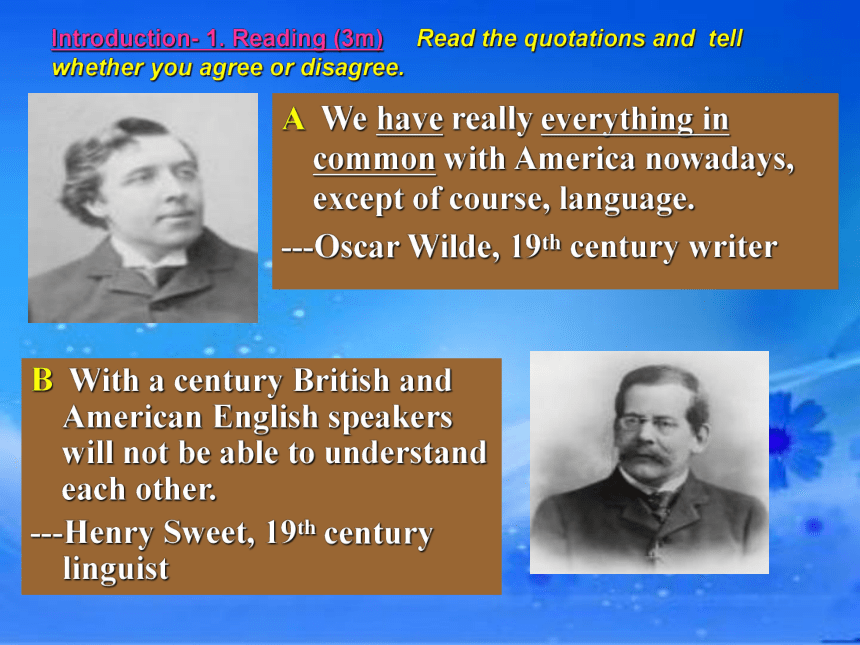
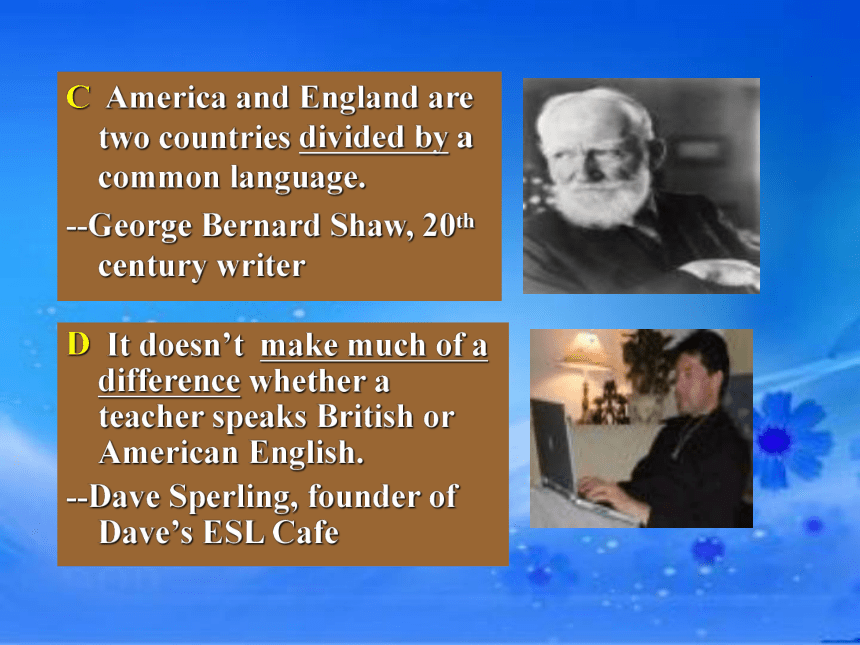
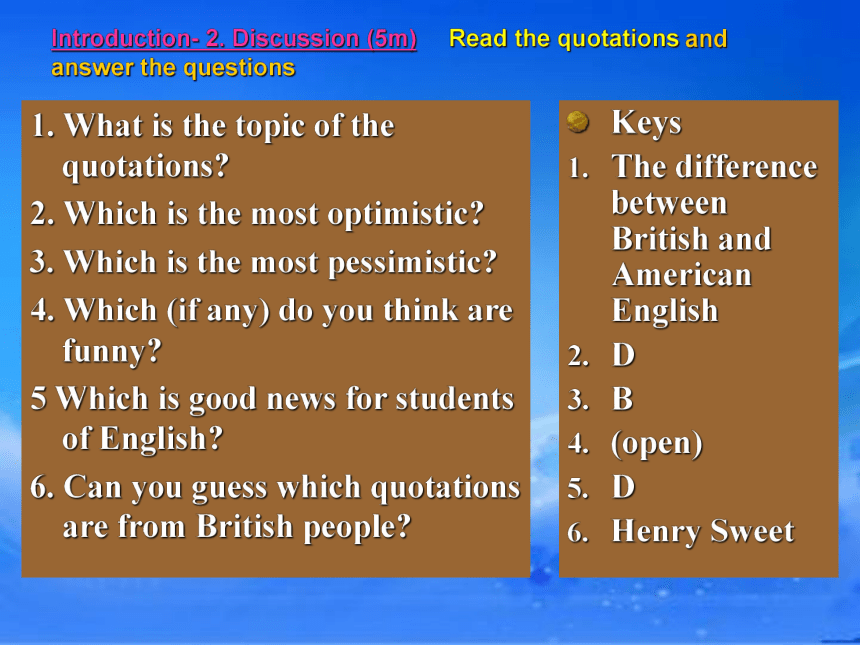
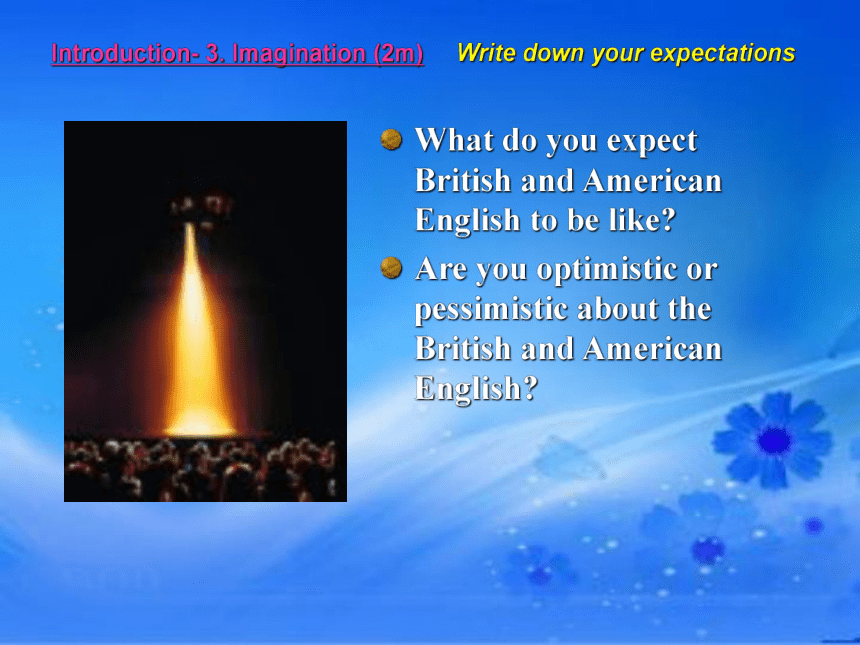
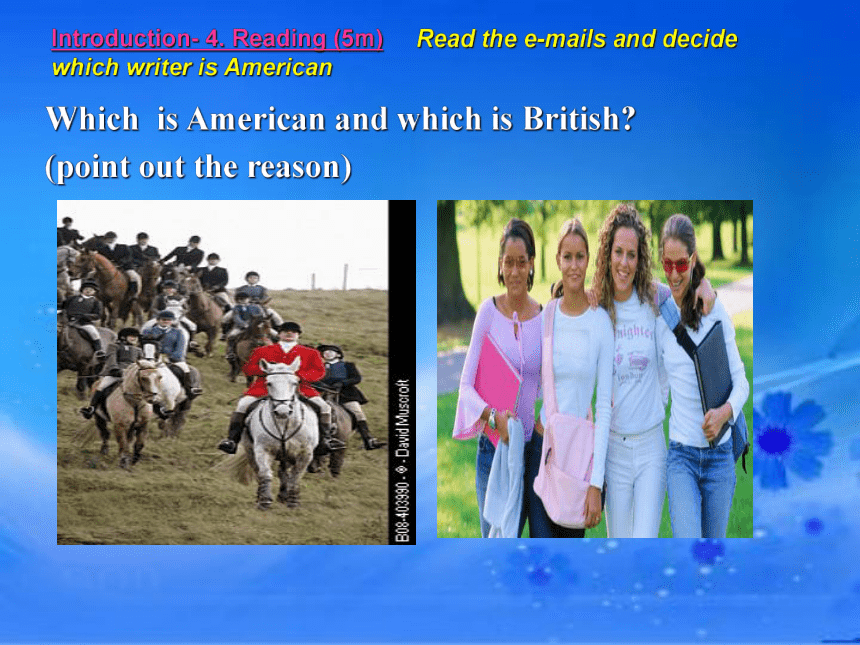
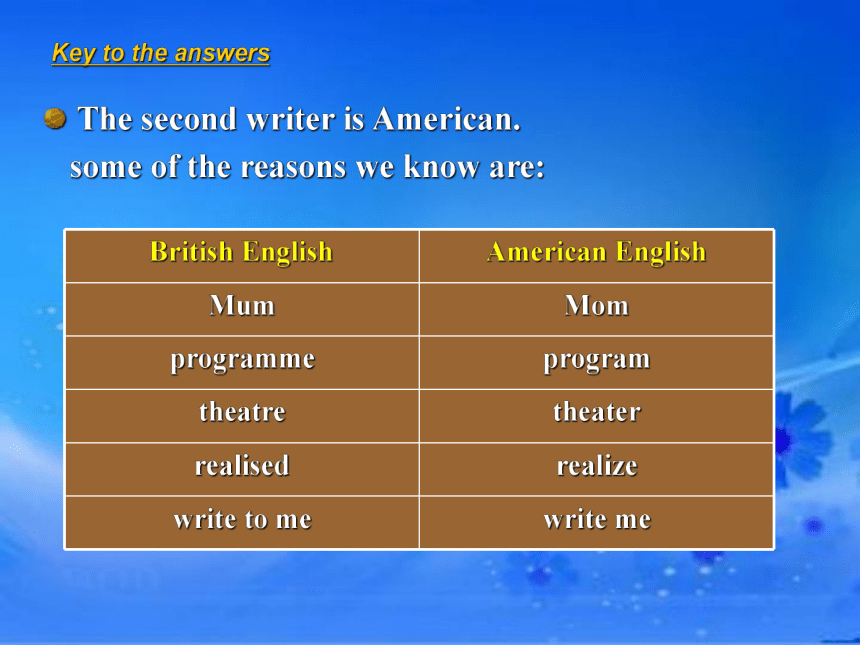
文档简介
课件19张PPT。Period 1Module 1
British and American English
Reading and SpeakingIntroduction- 1. Reading (3m) Read the quotations and tell whether you agree or disagree.A We have really everything in common with America nowadays, except of course, language.
---Oscar Wilde, 19th century writerB With a century British and American English speakers will not be able to understand each other.
---Henry Sweet, 19th century linguistC America and England are two countries divided by a common language.
--George Bernard Shaw, 20th century writerD It doesn’t make much of a difference whether a teacher speaks British or American English.
--Dave Sperling, founder of Dave’s ESL CafeIntroduction- 2. Discussion (5m) Read the quotations and answer the questions1. What is the topic of the quotations?
2. Which is the most optimistic?
3. Which is the most pessimistic?
4. Which (if any) do you think are funny?
5 Which is good news for students of English?
6. Can you guess which quotations are from British people?Keys
The difference between British and American English
D
B
(open)
D
Henry SweetIntroduction- 3. Imagination (2m) Write down your expectationsWhat do you expect British and American English to be like?
Are you optimistic or pessimistic about the British and American English?
Introduction- 4. Reading (5m) Read the e-mails and decide which writer is AmericanWhich is American and which is British?
(point out the reason)Key to the answersThe second writer is American.
some of the reasons we know are:
Reading and Speaking- 1. Warming-up (5m) Check the following statements.People from Hong Kong can understand people from Beijing.
People from Shanghai sound the same as people from Xi’an.
Chinese characters can be understood by all speakers of Chinese.
American English is very different from British English.
People from Britain can’t understand people from America.Discuss and the answers are open.Reading and Speaking- 2. Skimming (5m) Read the passage and find the differences between British English and American English. Read the titles and the first sentences of each paragraph and find four ways in which British and American English are different.Vocabulary
Grammar
Spelling
pronunciationReading and Speaking- 3. Scanning (10m) Read again paragraph by paragraph and make notes of the differences.The first two paragraphs: the differences in vocabularyautomobilesmotorwaypetrolsubwaycabflashlightqueue upFrench friesRead the third paragraphThe third paragraph: the differences in grammarDo you have…?My friend has just arrivedon the team/ weekendWrite to me soon!Read the 4th paragraphThe 4th paragraph: the differences in spelling and pronunciation
centre,colour programmecenter,color programReading and Speaking- 4. Practice (5m) Read the passage and complete the sentences with the correct words or phrases.There are ______ differences between American and British varieties of English.
A. no B. a few C. lots of
Americans ____ understand what the British are saying.
A. Sometimes B. usually C. never
There are ______ differences between British and American grammar.
A. no B. many C. not manyBBC4. American spelling is _______ British spelling.
A. the same as B. simpler than C. harder than
For a Londoner, an American accent may be easier to understand than _______.
A. a Chinese accent B. some British accents
C. a CNN newsreader
Television and the Internet have made it _____ for the British and Americans to understand each other.
A. harder B. easier C. impossibleBBBNotes:There are hundreds of different words which are not used on the other side of the Atlantic, or which are used with a different meaning.
The other two areas in which the two varieties differ are spelling and pronunciation.
The accent, which is most similar to British English, can be heard on the East Coast of the US.
A Londoner has more difficulty understanding a Scotsman from Glasgow than understanding a New Yorker.at the flick of a switch
But it has also led to lots of American words and structures passing into British English,…
This international dimension suggests that in the future, there are going to be many “Englishes”, not just two main varieties.Reading and Speaking- 5. Discussion (5m) Discuss the following questions.How many main varieties of Chinese are there?
In what ways are they different?
Do Chinese people from different regions have problems understanding each other?
What will happen to Chinese in the future?Homework – Task of the lessonTry to collect more words or expressions which are different in British English and American English in the 4 ways. (vocabulary, grammar, spelling and pronunciation)
Find some information about the Chinese that people in different regions of China speak .
British and American English
Reading and SpeakingIntroduction- 1. Reading (3m) Read the quotations and tell whether you agree or disagree.A We have really everything in common with America nowadays, except of course, language.
---Oscar Wilde, 19th century writerB With a century British and American English speakers will not be able to understand each other.
---Henry Sweet, 19th century linguistC America and England are two countries divided by a common language.
--George Bernard Shaw, 20th century writerD It doesn’t make much of a difference whether a teacher speaks British or American English.
--Dave Sperling, founder of Dave’s ESL CafeIntroduction- 2. Discussion (5m) Read the quotations and answer the questions1. What is the topic of the quotations?
2. Which is the most optimistic?
3. Which is the most pessimistic?
4. Which (if any) do you think are funny?
5 Which is good news for students of English?
6. Can you guess which quotations are from British people?Keys
The difference between British and American English
D
B
(open)
D
Henry SweetIntroduction- 3. Imagination (2m) Write down your expectationsWhat do you expect British and American English to be like?
Are you optimistic or pessimistic about the British and American English?
Introduction- 4. Reading (5m) Read the e-mails and decide which writer is AmericanWhich is American and which is British?
(point out the reason)Key to the answersThe second writer is American.
some of the reasons we know are:
Reading and Speaking- 1. Warming-up (5m) Check the following statements.People from Hong Kong can understand people from Beijing.
People from Shanghai sound the same as people from Xi’an.
Chinese characters can be understood by all speakers of Chinese.
American English is very different from British English.
People from Britain can’t understand people from America.Discuss and the answers are open.Reading and Speaking- 2. Skimming (5m) Read the passage and find the differences between British English and American English. Read the titles and the first sentences of each paragraph and find four ways in which British and American English are different.Vocabulary
Grammar
Spelling
pronunciationReading and Speaking- 3. Scanning (10m) Read again paragraph by paragraph and make notes of the differences.The first two paragraphs: the differences in vocabularyautomobilesmotorwaypetrolsubwaycabflashlightqueue upFrench friesRead the third paragraphThe third paragraph: the differences in grammarDo you have…?My friend has just arrivedon the team/ weekendWrite to me soon!Read the 4th paragraphThe 4th paragraph: the differences in spelling and pronunciation
centre,colour programmecenter,color programReading and Speaking- 4. Practice (5m) Read the passage and complete the sentences with the correct words or phrases.There are ______ differences between American and British varieties of English.
A. no B. a few C. lots of
Americans ____ understand what the British are saying.
A. Sometimes B. usually C. never
There are ______ differences between British and American grammar.
A. no B. many C. not manyBBC4. American spelling is _______ British spelling.
A. the same as B. simpler than C. harder than
For a Londoner, an American accent may be easier to understand than _______.
A. a Chinese accent B. some British accents
C. a CNN newsreader
Television and the Internet have made it _____ for the British and Americans to understand each other.
A. harder B. easier C. impossibleBBBNotes:There are hundreds of different words which are not used on the other side of the Atlantic, or which are used with a different meaning.
The other two areas in which the two varieties differ are spelling and pronunciation.
The accent, which is most similar to British English, can be heard on the East Coast of the US.
A Londoner has more difficulty understanding a Scotsman from Glasgow than understanding a New Yorker.at the flick of a switch
But it has also led to lots of American words and structures passing into British English,…
This international dimension suggests that in the future, there are going to be many “Englishes”, not just two main varieties.Reading and Speaking- 5. Discussion (5m) Discuss the following questions.How many main varieties of Chinese are there?
In what ways are they different?
Do Chinese people from different regions have problems understanding each other?
What will happen to Chinese in the future?Homework – Task of the lessonTry to collect more words or expressions which are different in British English and American English in the 4 ways. (vocabulary, grammar, spelling and pronunciation)
Find some information about the Chinese that people in different regions of China speak .
